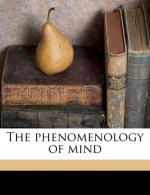
|
| Name: _________________________ | Period: ___________________ |
This test consists of 15 multiple choice questions and 5 short answer questions.
Multiple Choice Questions
1. What is the stage after the "beautiful soul" in Hegel's view?
(a) The Spirit is manfest in work.
(b) The mind attains enlightenment.
(c) The Spirit discovers its duty.
(d) The mind becomes the Absolute Spirit incarnate.
2. What is the ultimate result of action according to Hegel?
(a) Reconciliation of the universal and the particular.
(b) Self-awareness.
(c) Ethical behavior.
(d) Renewed conflict within the self.
3. How does Hegel approach morality?
(a) As a product of Spirit's development.
(b) As a form of consciousness in itself.
(c) As a consequence of self-consiousness.
(d) As a reason for living.
4. According to Hegel, what does each action lead to?
(a) A new occasion for self-awareness to be born.
(b) The death of all other possible actions.
(c) The need to mediate with self-consciousness.
(d) Unification of Spirit and Mind.
5. The spirit that creates artwork also creates what else according to Hegel?
(a) Social change.
(b) Industrial technology.
(c) Scientific instruments.
(d) The soul of a free country.
6. How does Idealist philosophy describe the world?
(a) As the result of divine work.
(b) As full of attributes of consciousness.
(c) As the manifestation of human divinity.
(d) As the externalization of animist rituals.
7. Why does Hegel say that "property" is superior to "no property"?
(a) Because property can function independently of 'no property' but 'no property' cannot function independently.
(b) Because no property is an absence that depends on the concept of property.
(c) Because property makes people think short term.
(d) Because property makes people think long term.
8. In Hegel's philosophy, in what way does the Spirit serve a two-fold function?
(a) It contains both the universal and eternal and the particular and contingent.
(b) It observes itself as object at the same time that it is subject.
(c) It is acts at the same time that it reposes.
(d) It understands at the same time that it is beyond understanding, even to itself.
9. What work marks the progress through Hegel's text and meanings?
(a) Practice and repetition.
(b) Physical training.
(c) Study and memorization.
(d) Meditation and transcendence.
10. What does the "artificer" represent in Hegel's philosophy?
(a) The artificer represents the light of the Absolute shining into the consciousness.
(b) The artificer represents thought combined with action upon reality.
(c) The artificer represents the manifestation of Absolute Mind.
(d) The artificer represents constant artistic self-reinvention.
11. How is belief transformed into enlightenment according to Hegel?
(a) Everything is reaffirmed in its divine aspect.
(b) Everything is rejected as distraction from the divine.
(c) Everything is accepted as evidence of the divine.
(d) Everything is doubted and questioned.
12. Which religion comes first, in Hegel's philosophy?
(a) Moral religion.
(b) Human religion.
(c) Natural religion.
(d) Instinctual religion.
13. What does Hegel equate with Spirit?
(a) Mind.
(b) Consciousness.
(c) History.
(d) Reason.
14. According the Hegel's philosophy, what is the one state where complete annihilation of difference occurs?
(a) Loss.
(b) Transcendentalism.
(c) Self-awareness.
(d) Death.
15. What does Hegel contrast darkness to?
(a) Vision.
(b) Creativity.
(c) Reason.
(d) Consciousness.
Short Answer Questions
1. What happens when Spirit turns back on itself according to Hegel?
2. What does Hegel include in the religion of art?
3. How does Hegel describe the moral consciousness?
4. What does the belief in the Underworld transform into according to Hegel?
5. According to Hegel's philosophy, what will lead people to the goal of Absolute self-conscious Spirit?
|
This section contains 602 words (approx. 3 pages at 300 words per page) |

|




